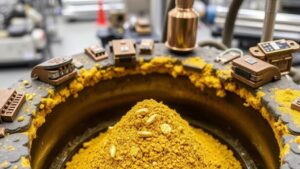Selling to Refiners: How to Choose a Reputable Buyer
Selling to Refiners: How to Choose a Reputable Buyer
In the precious metals market, selling to refiners is a critical aspect for businesses and individuals looking to maximize the value of their materials. But, selecting a reputable buyer for refining services can be a daunting task. This article aims to guide sellers through the process, ensuring they make informed decisions that safeguard their interests.
Understanding the Refining Process
Refining involves the extraction of precious metals from ores or recycled materials to produce pure metal forms. This process is essential for the recovery of valuable metals, including gold, silver, platinum, and palladium. For example, when selling scrap gold, a refiner assesses the metal content and determines its purity via chemical analysis or fire assay methods.
Identifying Reputable Refiners
Choosing a reputable refiner is essential for obtaining fair pricing and ensuring satisfaction with the transaction. Here are key factors to consider:
- Accreditation: Look for refiners that are accredited by recognized organizations, such as the London Bullion Market Association (LBMA) or the Responsible Jewellery Council (RJC). Accreditation indicates compliance with industry standards.
- Reputation: Research reviews and testimonials from past clients. Online platforms and industry forums often provide insights into a refiner’s reliability and customer service.
- Transparency: A reputable refiner should provide clear information on their refining process, pricing structure, and turnaround times. Transparency builds trust and reduces the risk of misunderstandings.
Evaluating Pricing and Fees
Understanding the pricing structure is crucial for sellers. Refiners typically offer a purchase price based on the spot market value of precious metals, adjusted for purity and weight. It’s imperative to assess the following:
- Spot Market Prices: Stay informed about current market values, typically quoted in major financial news outlets. Regularly monitoring these prices can help sellers negotiate better terms.
- Refining Fees: Inquire about any additional fees associated with the refining process, such as assay charges or handling fees. Knowing the full financial implications upfront can prevent unpleasant surprises later in the process.
Case Study: Successful Transactions
An illustrative case is represented by XYZ Metals, a small jewelry manufacturer that sought to sell its scrap gold. By selecting a refiner accredited by the LBMA and providing a transparent fee structure, XYZ Metals received a prompt payout significantly above the industry average. Their proactive research into the world gold prices allowed them to negotiate effectively, turning what could have been a loss into a lucrative transaction.
Addressing Concerns about Security and Trust
Security and trust are paramount when dealing with valuable commodities. Sellers often express concerns regarding the shipment and handling of precious metals. Here are practical measures to enhance security:
- Shipping Options: Use insured and traceable shipping methods, such as registered mail or specialized logistics companies that cater to precious metals.
- Proof of Transaction: Ensure that all agreements and transactions are documented. Receipts and contracts serve as a record and provide legal protection.
Actionable Takeaways
When selling to refiners, a systematic approach can make all the difference:
- Conduct thorough research on potential refiners, focusing on accreditation and reputation.
- Evaluate pricing carefully, including understanding spot prices and any additional fees involved.
- Take proactive steps to ensure security throughout the transaction process.
By adhering to these guidelines, sellers can confidently navigate the complex landscape of selling to refiners, ensuring they receive fair value for their materials while minimizing risks.

